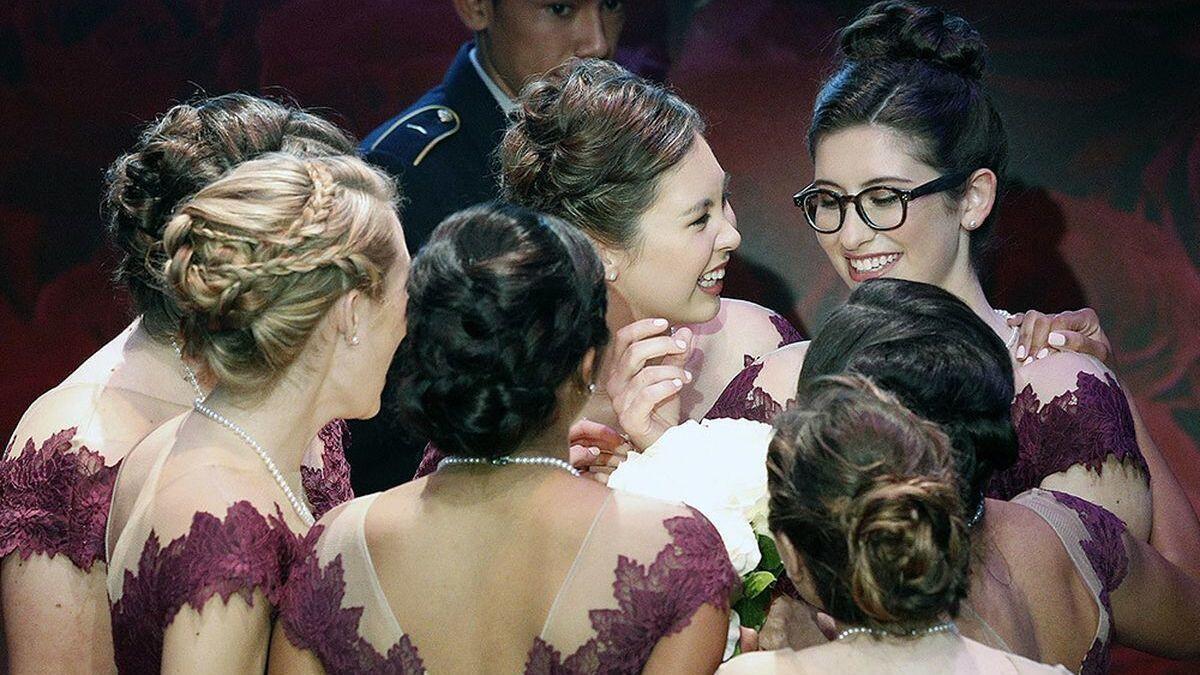Op-Ed: I am Jewish. I wear glasses. I am bisexual — and I’m the Rose Queen

- Share via
I had to be fitted for a crown. Not the Halloween costume kind — this one is covered in cultured pearls and pave diamonds and comes with its own security detail. Apparently every queen needs one, and I am Queen Louise.
This whole experience began as a lark. My friend and I lined up with the other thousand applicants interviewing for the Tournament of Roses Royal Court in Pasadena because we wanted the two complimentary tickets to the Royal Ball that came with applying.
I don’t consider myself the royal type. I tend to trip down stairs rather than glide, and I might choose a good game of Scrabble over a palace ball. I didn’t even have much of a princess phase as a child — more backyard mud pies than dress-up tea parties. Yet, improbably, on New Year’s morning, I will take my place in the Rose Parade among a group of young women in gowns and crowns, waving from a flower-adorned float, as the 101st Rose Queen.
The first interview round was brief — I stood before a panel of 11 judges in white suits and explained why I wanted to be on the Royal Court. I told them that I was a future scientist, and that “it would be a great honor and privilege to represent the Tournament of Roses, my hometown of Pasadena and Southern California to the world.”
I was surprised to receive an email inviting me to the next interview round. And the next, and the next. Each successive interview was longer than the one before. We were asked a range of questions: Was there a time we had worked harder than necessary on a project? What would we change about the world?
I always tried to be direct in my answers. I wanted it to be clear that, if selected for the Royal Court, I would use the platform to advocate for what I value, particularly for science education, for the importance of science informing public policy, and for inclusion. Four interview rounds later, they called my name from among 44 finalists.
Part of the tradition feels antiquated — the titles, the etiquette lessons, the matching outfits. But, I have come to understand, these conventions are pieces of a tradition that also gives young women a powerful platform and asks only that we represent ourselves honestly.
In our role as ambassadors, we volunteer with local charities and speak to more than a hundred organizations about what is most important to us. Princess Rucha Kadam encourages young women to pursue computer science and addresses the unequal treatment she has faced in the field because of her gender. Helen Rossi speaks about using community service and advocacy to cope with an incurable disease. Sherry Ma talks about her work on her school’s newspaper and yearbook, and the value of responsible journalism in our world today. I speak about my experience in research labs and about the importance of scientific literacy.
Every day, young children approach us and tell us that they hope to study science, or that they will find ways to help others, or that they want to speak up for themselves, as we are doing. I am lucky to be part of this group of smart, independent, ethical young women.
Still, I am aware that while today’s Royal Court celebrates accomplishment and inclusion, it hasn’t always been that way and that the tradition hasn’t always belonged to all of Pasadena.
Once the exclusive bastion of a narrow segment of society, the traditions of the parade have changed gradually. The first African American Rose Queen was named in 1985. The Tournament of Roses had its first female president in 2006. The first African American president, Gerald Freeny, is serving this year. And in 2026, the association will be led by the first president who is part of the LGBTQ community. With each passing year, the Rose Parade and Royal Court look a bit more diverse, a bit more like America.
Enter the Fray: First takes on the news of the minute from L.A. Times Opinion »
The 2019 Royal Court is one of the most diverse in the tournament’s history. We are of many different religious, racial and socioeconomic backgrounds. Personally, I am happy to be the first Rose Queen to wear glasses on the float (even though they clash with the crown), and the first Rose Queen to talk about being Jewish. I feel an additional responsibility, to myself and to this tradition, to share that I am bisexual.
I never considered that my sexual orientation might be of interest to anyone but my family and my closest friends. But in this new, very public position, I feel it’s important to present myself authentically, especially to those who look to the Royal Court as a representation of our community. While I am almost certainly not the first member of the LGBTQ community on the court, I hope that by saying so publicly, I might encourage others to be proud of who they are.
On Jan. 1, I will be waving to everyone from our parade float, but especially to those out there who need a little extra courage to be themselves. And I’ll be waving to their family and friends, who cheer them on, because I understand that acceptance also takes courage. I can’t wait to see you at the Rose Parade. But more to the point, I hope you see yourself in the Rose Parade too.
Louise Deser Siskel is a senior at Sequoyah High School in Pasadena. She will attend the University of Chicago in the fall.
Follow the Opinion section on Twitter @latimesopinion or Facebook
More to Read
A cure for the common opinion
Get thought-provoking perspectives with our weekly newsletter.
You may occasionally receive promotional content from the Los Angeles Times.









